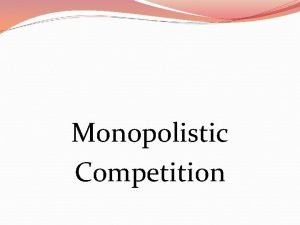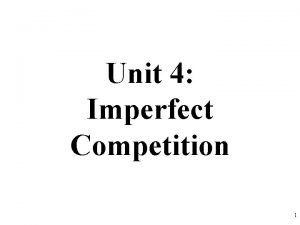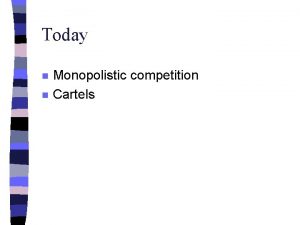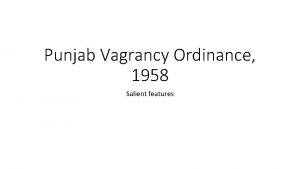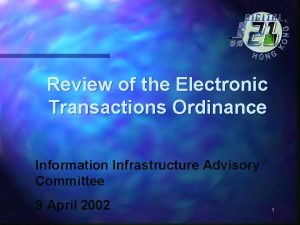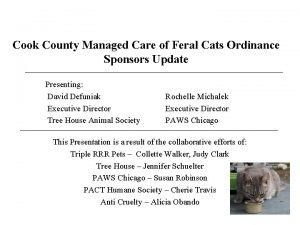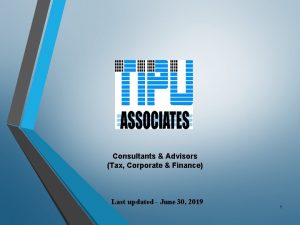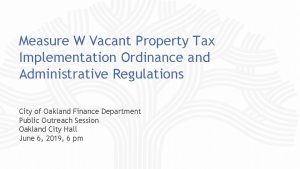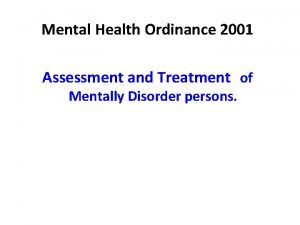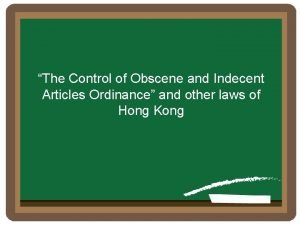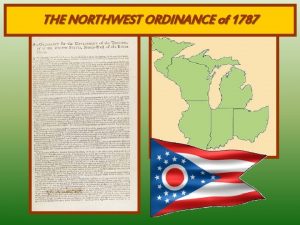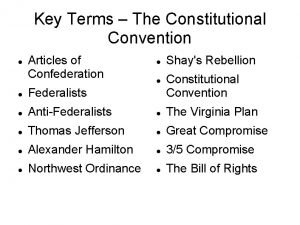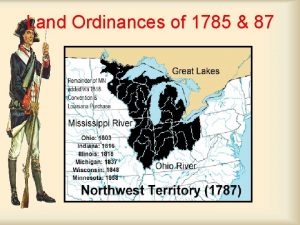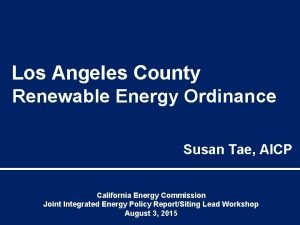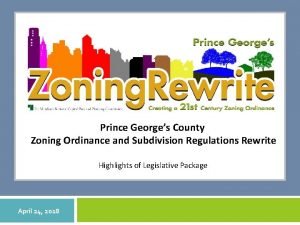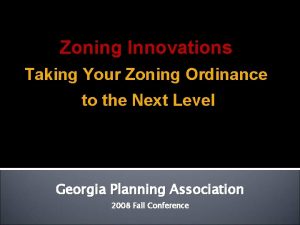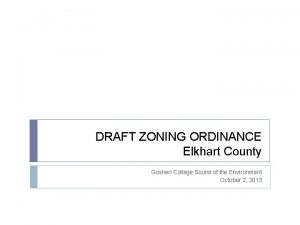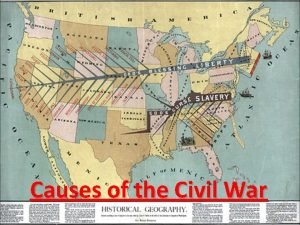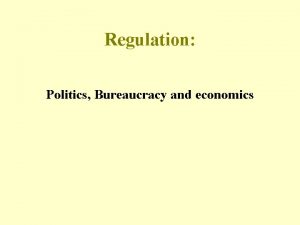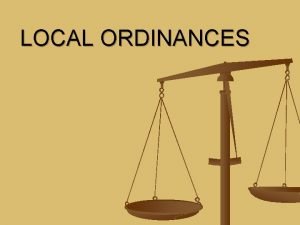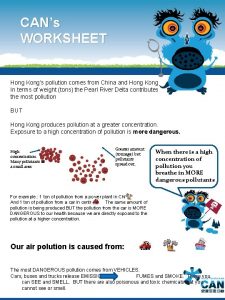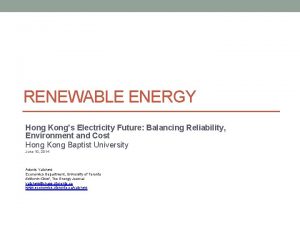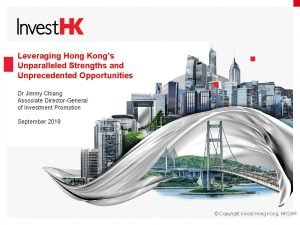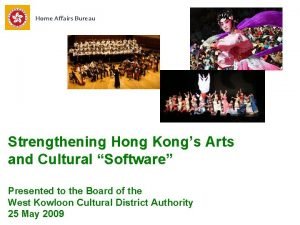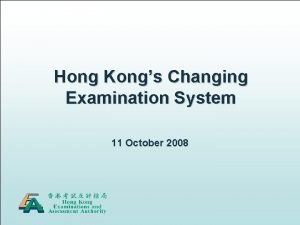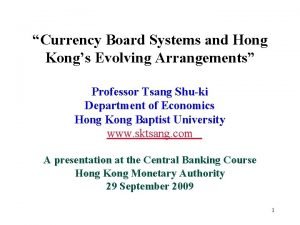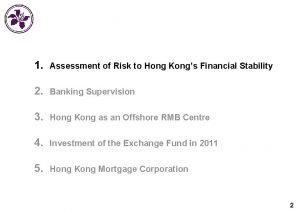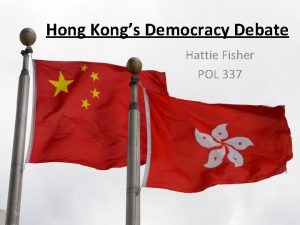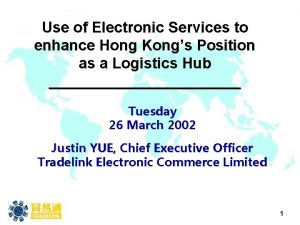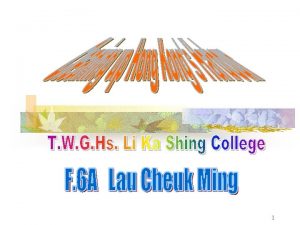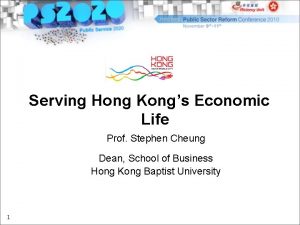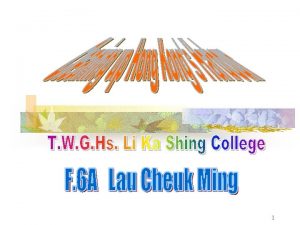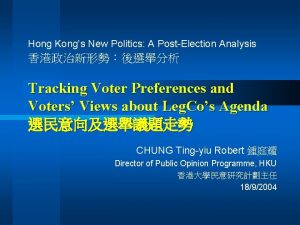Impact of Hong Kongs Competition Ordinance on the














































- Slides: 46

Impact of Hong Kong’s Competition Ordinance on the Construction Industry Norton Rose Fulbright Hong Kong Alfred Wu Pearl Yeung October 2016

The Hong Kong Competition Ordinance Things you need to know 1. Entered into force on 14 December 2015 2. Heavy sanctions 3. We cannot discuss prices and other confidential matters with our competitors 4. Common practices in the construction industry that give rise to risks 5. Competition Commission has extensive investigation powers 6. Watch your language! 2

Overview of the Competition Ordinance Three pillars of competition law Anticompetitive agreements 3 Abuse of market power Merger control

1. Entry into force 4

Entry into force On 14 December 2015 • All contracts (even the old contracts) are subject to the new rules 5

Relevance to your business • Introduction of cross-sector competition law in Hong Kong • Likelihood of competition law scrutiny has increased, including in the construction sector • Bid-rigging has already been investigated and sanctioned in the past (before the entry into force of the Competition Ordinance). The Ordinance will make enforcement even easier. Ø Bid-rigging cartel (operated through an SPV) amongst suppliers of components and materials of steel gates to regulate prices (including tender prices) submitted to contractors approved by the Housing Authority to supply stainless steel gates for its projects (1997) Ø Bid-rigging cartel amongst Tai Po market stall keepers in connection with a an auction organised by the Food & Environmental Hygiene Department (2010) • Outside of Hong Kong, bid-rigging is a practice that is frequently sanctioned in Indonesia, Japan and Korea, both in the context of public and private sector tenders • Common competition law issues in the construction sector 6

2. Heavy sanctions 7

Heavy sanctions • For “serious” infringements (such as bid-rigging and price-fixing) – up to 10% of group annual turnover in Hong Kong for each year the infringement lasted (up to 3 years – i. e. 30%) • For other infringements (such as exclusivities) – financial penalties will be less likely • Sanctions on individuals “involved” in the conduct: including fines and director disqualification orders • Other sanctions: civil damages, confiscation of illegal profits, payment of the Competition Commission’s investigation costs, etc. • Whistle-blowing mechanism: immunity from penalties in exchange for co-operation 8

3. First conduct rule 9

The first conduct rule Applies to all anticompetitive agreements, including agreements: a) with competitors; b) with suppliers; c) with customers. supplier Construction firm customer 10 Construction firm

Statutory bodies 11

The Ordinance does not apply to statutory bodies • Statutory bodies enjoy immunity under the Competition Ordinance. Where a statutory body is involved in an infringement, it will not be accountable, even if it has assisted with or induced the infringement. Ø Statutory bodies include: Airport Authority, Buildings Department, Drainage Services Department, E&M Services Department, Highways Department, Housing Authority, Lands Department, Urban Renewal Authority, MTR Corporation, Universities etc Ø Exceptions: Ocean Park Corporation, Matilda and War Memorial Hospital, Kadoorie Farm and Botanic Garden Corporation; The Helena May; Federation of Hong Kong Industries; and The general committee of the Federation of Hong Kong Industries. • Accordingly, there is a higher risk that liability in respect of agreements with government bodies will only fall on private sector suppliers only. 12

Horizontal risks 13

Horizontal risks supplier Construction firm customer 14 Construction firm

First high risk area: competitors Hardcore conduct Price fixing Bid-rigging Limiting supply Customer or market allocation Exchanges of competitively sensitive information High risks High sanctions 15

High risk area: examples You work at X firm and your friend works at Y firm. You meet at a bar for drinks after work. She suggests as follows: × only Y firm should bid for the provision of construction services in an upcoming tender organised by a particular property developer × Y firm and X firm would take turns to win in the next four tenders × both X firm and Y firm should refuse to bid in a tender in relation to a new development for a particular developer × X firm and Y firm should agree on their bidding price × both X firm and Y firm should increase their interior decoration and fitting out fees by 3% next month × if X firm increases its interior decoration and fitting out fees by 2%, Y firm will increase its maintenance work project fees by 2% All of the above are high risk. All of these arrangements are hardcore cartels. All of them are illegal. 16

Information exchanges with competitors Any exchange with competitors of non-public, strategically or competitively sensitive data carries a risk of infringement. Low-no risk Grey zone High risk (never share with a competitor without legal advice) • Production costs • Public domain • Non-strategic • Truly historic • Aggregated (i. e. not individualised) and anonymised (e. g. salaries, raw material costs; advertising costs, payments to contractors and consultants) • Demand data (e. g. projected demand for construction services) • Customer-related information (e. g. contract terms, customer’s future plans) • Sales and sales targets • Capacity (e. g. supply forecasts) • Marketing plans • Investment plans 17 Future data on: • Pricing or elements of price (e. g. discounts and bidding terms) • Margins • Levels of return

Information exchanges: how to avoid risks with competitors? • Publicly distance yourself from competitors that share commercially sensitive information – Liability can arise from simply receiving inappropriate information – “I do not believe you, I do not want to know. Never give me this information again. ” • Report to your team manager and seek guidance from legal Information sharing: only with customers/ suppliers • It is OK to ask for and receive information from customers/ suppliers (e. g. property developers or sub-contractors) about what our competitors are doing. • BUT, it is NOT OK to ask a customer/supplier to speak to a competitor on our behalf. 18

Vertical risks 19

Vertical risks supplier Construction firm customer 20 Construction firm

Possible risk area: relationships with suppliers and customers (e. g. property developers or subcontractors) Examples of vertical arrangements that are potentially restrictive Exclusivities Non-competes (restrictive covenants) Legality depends on effects Cons Pros Other benefits Restrictive effects 21 Efficiencies

Vertical restrictions – sometimes risky The clauses set out below are generally legitimate but sometimes they may give rise to risks. Risks are unlikely if each party has less than 30% market share and the restriction is limited in scope and duration • Preventing a supplier, sub-contractor or property developer from providing their services to a competing general contractor (for example, for the duration of a construction project to ensure that the sub-contractor has sufficient capacity) • Restricting a sub-contractor’s ability to set up a business that competes with a general contractor’s business Market definition – how to determine your market share? 22

4. Common practices in the construction industry 23

Common practices in the construction industry Some practices common to the construction industry may give rise to infringement risks under the Competition Ordinance. These include: • Participation in trade associations and government-initiated discussions • Collective negotiations • Joint bidding These practices will be discussed in a series of case studies below. All scenarios are hypothetical. 24

Trade associations 25

Case study (1) – trade associations Question: On behalf of X firm, you attend a meeting organised by the Hong Kong Construction Association to discuss certain guidelines or recommendations in respect of fees payable to sub-contractors. Among the attendees are representatives from your competitors. (1) Can you discuss this issue with representatives from other construction firms? (2) Should you even be attending this meeting? 26

Case study (2) – trade associations Question: On behalf of X firm, you attend a meeting organised by the Hong Kong Construction Association to discuss the Central-Wanchai Bypass and Island Eastern Corridor Link. Among the attendees are representatives from your competitors. (1) Can you discuss this issue with representatives from other construction firms? (2) What if the discussions then touch on a new highway improvement project for which the Highways Department is expected to issue a tender for? 27

Case study (3) – government-initiated discussions Question: The Urban Renewal Authority has called a meeting amongst construction firms in response to recent complaints that renovation and maintenance project fees are too high. (1) Can you attend this meeting? (2) Can the Urban Renewal Authority be held liable for a possible infringement? 28

Practical tips: dos and don’ts DO NOT • Provide competitively sensitive information to competitors or obtain competitively sensitive information from them (except where these are already in the public domain) • Join, lead or participate in a trade association which has an anticompetitive objective DO • Obtain a written agenda before attending all meetings • Ensure that there are no competitively sensitive items on the agenda before attending meetings. • Reject any attempts to discuss competitively sensitive information at meetings; leave the meeting if the discussion continues and make a note of your objection and departure. • Make sure your objection and departure is also noted in the trade association’s meeting minutes 29

Collective negotiations 30

Case study (4) – collective negotiations Question: A number of construction firms are unhappy with the terms of a specific tender offer recently organised by a property developer. These firms have suggested that the issue be referred to the Hong Kong Construction Association so that better terms and conditions can be negotiated on their behalf. (1) Does this situation give rise to any risks? (2) What if an independent third-party consultant were to be hired to conduct negotiations with a property developer on behalf of the construction firms? 31

Case study (5) – lobbying Question: The Government has recently released for public consultation its proposal to review existing quality standards applicable to building materials. A number of construction firms would like to submit their views through the Hong Kong Construction Association. (1) Does this situation give rise to any risks under the Competition Ordinance? 32

Practical tips: dos and don’ts DO NOT • Provide competitively sensitive information to competitors or obtain competitively sensitive information from them (except where these are already in the public domain) DO • Ensure that any competitively sensitive information is aggregated anonymised before being shared (for example, by an independent third-party) 33

Joint bidding 34

Case study (6) – Joint bidding Question: The Drainage Services Department has organised a tender offer concerning a large-scale drainage tunnelling project. Your firm is amongst a number of construction firms that would like to bid jointly for the project. (1) Does this situation give rise to any risks under the Competition Ordinance? (2) What kind of precautions must your firm take to minimise risks? (3) Can these firms agree to exclude a particular construction firm from all future consortium arrangements? 35

Best practices DO NOT • Be part of more than one bidding consortium • Provide or obtain competitively sensitive information during consortium negotiations - wait until joint bidding partners have been confirmed • Provide to or obtain from your consortium partners information on matters unrelated to the purpose of the joint consortium DO • Make clear to the customer (including in all documentation) that you are submitting a joint bid • Provide justifications for the consortium in bidding documentation (such as lack of resources, risk diversification, reliance on one party’s expertise or technology to satisfy tender specifications) • Ensure that any competitively sensitive information shared is strictly confined to the scope of and does not extend to persons outside of the joint consortium 36

5. Investigations 37

Competition Commission’s investigation powers Dawn raids • Unannounced on-site inspections (after obtaining a court warrant) – the Commission conducted its first dawn raids in August this year in relation to a bid-rigging investigation • Officials can search, copy and/or confiscate relevant documents and equipment (including whatsapp messages, wechat conversations) Other investigation powers • Order the production of documents and other information • Require relevant persons to attend hearings before it to answer questions 38

6. Watch your language! 39

Language tips • DO NOT • Use language that implies wrongdoing (e. g. “we are not supposed to tell you this but…” or “please destroy this email…”) • Use expressions which would suggest that the general attitude of your firm is to reduce or eliminate competition alone or in concert with competitors. 40

Wrap up 41

Things to remember 1. Entered into force on 14 December 2015 2. Heavy sanctions 3. With our competitors: we cannot discuss prices and other confidential matters with other construction firms 4. Competition Commission has extensive investigation powers 5. Watch your language! 42

Alfred Wu Partner Norton Rose Fulbright Hong Kong +852 3405 2528 alfred. wu@nortonrosefulbright. com Alfred is a specialist construction lawyer highly experienced in a broad range of contentious and noncontentious matters concerning complex and high-value infrastructure and building projects. On the contentious side, Alfred regularly represents government bodies, employers, engineers, architects, contractors and subcontractors in litigation and arbitration involving the full spectrum of contractual and tortious construction issues. He also represents clients in construction-related criminal investigations and prosecutions. On the non-contentious side, he advises on tendering processes, consultancy agreements, formation of joint ventures, post-contract risk issues as well as construction bonds, guarantees and other construction related instruments. Alfred also sits regularly as an arbitrator. Alfred obtained his JD degree from Osgoode Hall Law School in Ontario, Canada in 1995. He is qualified to practice law in Hong Kong, England Wales and Ontario, Canada. Prior to his legal qualifications, he was a civil engineer with a leading international firm of geotechnical consultants, having obtained his B. Sc. and M. Sc. degrees in engineering in the UK and Canada respectively. He is fluent in Cantonese, Mandarin and English. Alfred is Vice-Chair of the International Projects Committee of the Inter-Pacific Bar Association 2016 -2018, a Fellow of the Chartered Institute of Arbitrators, a Fellow of the Hong Kong Institute of Arbitrators, and a Companion Member of the Hong King Institution of Engineers, an HKIAC Accredited Mediator, a member of the HKIAC List of Arbitrators and a panel arbitrator of the KLRCA. 43

Pearl Yeung Associate Norton Rose Fulbright Hong Kong +852 3405 2515 pearl. yeung@nortonrosefulbright. com Pearl Yeung is an antitrust, competition and regulatory lawyer based in Hong Kong. Pearl advises Asia-based and multi-national companies on international cartel investigations, multi-jurisdictional merger filings, market abuse issues and general competition compliance matters in a number of industry sectors such as education, media and television, telecommunications, multimedia business platforms, oil and gas, transport and infrastructure, financial services, real estate and fastmoving consumer goods. Her experience also extends to corporate matters including initial public offerings, secondary listings, reorganisations, mergers, acquisitions and listing-related compliance matters. Pearl joined our practice in 2009 and was admitted as a solicitor in the High Court of Hong Kong in 2011. She is a native speaker of Cantonese and English and also speaks French and Mandarin. 44

Disclaimer Norton Rose Fulbright US LLP, Norton Rose Fulbright Australia, Norton Rose Fulbright Canada LLP and Norton Rose Fulbright South Africa Inc are separate legal entities and all of them are members of Norton Rose Fulbright Verein, a Swiss verein. Norton Rose Fulbright Verein helps coordinate the activities of the members but does not itself provide legal services to clients. References to ‘Norton Rose Fulbright’, ‘the law firm’ and ‘legal practice’ are to one or more of the Norton Rose Fulbright members or to one of their respective affiliates (together ‘Norton Rose Fulbright entity/entities’). No individual who is a member, partner, shareholder, director, employee or consultant of, in or to any Norton Rose Fulbright entity (whether or not such individual is described as a ‘partner’) accepts or assumes responsibility, or has any liability, to any person in respect of this communication. Any reference to a partner or director is to a member, employee or consultant with equivalent standing and qualifications of the relevant Norton Rose Fulbright entity. The purpose of this communication is to provide general information of a legal nature. It does not contain a full analysis of the law nor does it constitute an opinion of any Norton Rose Fulbright entity on the points of law discussed. You must take specific legal advice on any particular matter which concerns you. If you require any advice or further information, please speak to your usual contact at Norton Rose Fulbright. 45

 Market structure venn diagram
Market structure venn diagram Perfect competition vs monopolistic competition
Perfect competition vs monopolistic competition Perfect competition vs monopolistic competition
Perfect competition vs monopolistic competition Perfect competition vs monopolistic competition
Perfect competition vs monopolistic competition The punjab vagrancy ordinance, 1958 pdf
The punjab vagrancy ordinance, 1958 pdf Electronic transactions ordinance
Electronic transactions ordinance Land ordinance of 1785
Land ordinance of 1785 Northwest ordinance of 1787
Northwest ordinance of 1787 Hec
Hec Spay cook county
Spay cook county Northwest ordinance of 1787
Northwest ordinance of 1787 Nccpl
Nccpl Northwest ordinance of 1787
Northwest ordinance of 1787 Oakland measure w
Oakland measure w Mental health ordinance
Mental health ordinance Obscene and indecent articles ordinance
Obscene and indecent articles ordinance Northwest ordinance of 1787
Northwest ordinance of 1787 What is the northwest ordinance
What is the northwest ordinance Upper allen township zoning map
Upper allen township zoning map Northwest ordinance of 1787
Northwest ordinance of 1787 Northwest ordinance of 1787
Northwest ordinance of 1787 Tae no.790
Tae no.790 Debate over secession in georgia
Debate over secession in georgia Pg county zoning ordinance
Pg county zoning ordinance Northwest ordinance of 1787
Northwest ordinance of 1787 What is the significance of the northwest ordinance? *
What is the significance of the northwest ordinance? * Ordinance
Ordinance Elkhart county zoning
Elkhart county zoning Model lighting ordinance
Model lighting ordinance Northwest ordinance lead to civil war
Northwest ordinance lead to civil war Regulation economics definition
Regulation economics definition Local ordinance
Local ordinance Bổ thể
Bổ thể Từ ngữ thể hiện lòng nhân hậu
Từ ngữ thể hiện lòng nhân hậu Tư thế ngồi viết
Tư thế ngồi viết V. c c
V. c c Thơ thất ngôn tứ tuyệt đường luật
Thơ thất ngôn tứ tuyệt đường luật Hát lên người ơi alleluia
Hát lên người ơi alleluia Khi nào hổ mẹ dạy hổ con săn mồi
Khi nào hổ mẹ dạy hổ con săn mồi Diễn thế sinh thái là
Diễn thế sinh thái là đại từ thay thế
đại từ thay thế Vẽ hình chiếu vuông góc của vật thể sau
Vẽ hình chiếu vuông góc của vật thể sau 101012 bằng
101012 bằng Cong thức tính động năng
Cong thức tính động năng Tỉ lệ cơ thể trẻ em
Tỉ lệ cơ thể trẻ em Thế nào là mạng điện lắp đặt kiểu nổi
Thế nào là mạng điện lắp đặt kiểu nổi Lời thề hippocrates
Lời thề hippocrates

